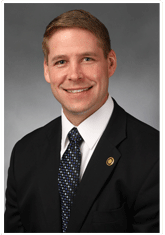JEFFERSON CITY — On Nov. 30, the governor called the General Assembly into an extraordinary session to consider expanding current incentive packages to accommodate an expansion in the aerospace industry. While the specific target is well known, the Boeing Company, the proposed language is not specific to it, but includes any aerospace project. In fact, Senate Bill 1 would authorize incentives for any aerospace industry project that would receive a proposal of benefits prior to June 10, 2014, as well as create no less than 2,000 jobs within 10 years. The measure also places a $150 million per year cap on the incentives.
Boeing is looking for a place to build its new commercial airliner, the 777X. The plan was to build it in Washington, but the machinist union there was unwilling to consider concessions regarding its pension plan. Boeing has now put out a Request for Proposal (RFP), which as many as nine states are currently considering. St. Louis currently has a Boeing facility, which employs 15,000 workers who build Boeing military jets, making Missouri a potential target. Answers to the Boeing RFP are due by Dec. 10, which is why a special session was needed.
Last year, the General Assembly combined several economic development packages into one new, streamlined program called Missouri Works. A tandem program, Missouri Works Training, was also created from previous packages. The governor is using those two programs, a program designed to help with construction called BUILD Missouri, and the state tax increment finance program to offer incentives to Boeing. The positive part of these programs, purposefully created this way by the Legislature, is that no money is spent unless a certain number of jobs are created. If Boeing chooses not to come here, no tax dollars will be spent. If it creates fewer jobs than expected, incentives are only paid on the number of jobs actually created.
The governor’s proposal expands the current programs by targeting up to $150 million per year to the aerospace industry. The number would be dependent on the number of jobs, which are estimated from 2,000 to 8,000, based on what parts of the Boeing project come to Missouri. The programs work by taking the personal income taxes paid by new employees and returning them to the company for a period of six years. There is also a possibility, depending on how the programs are combined, that a refund above that amount will be earned. The governor provided a detailed document showing the potential costs, year by year, for each program depending on how many new jobs were created.
What the governor did not give much detail on, other than an estimated number, is what Missouri would get back. There would, of course, be other taxes collected on Boeing. Employees would spend the money and create increased sales tax. Suppliers and construction companies would pay full taxes. That there would be a revenue boost is not questionable. How much of a boost and whether it would exceed what the state would pay out is the question. Missouri uses models to determine how revenues would increase. The validity and accuracy of those models has been questioned by me and others for years. A 2012 state audit of Missouri Works, then called Quality Jobs, showed that many programs did not meet the estimated revenue projections. This means any investment is a risk to Missouri taxpayers.
On Wednesday, Dec. 4, the Senate passed SB 1 by a vote of 23-8. I voted against the bill, due to my long-held stance against creating new tax credits when we need to work on reforming what is already in place.
Please feel free to contact me with any questions or concerns at any time. We look forward to hearing your comments and suggestions and trying to answer any questions you may have. You can reach us by phone at 573-751-1464, or e-mail at will.kraus@senate.mo.gov. |



